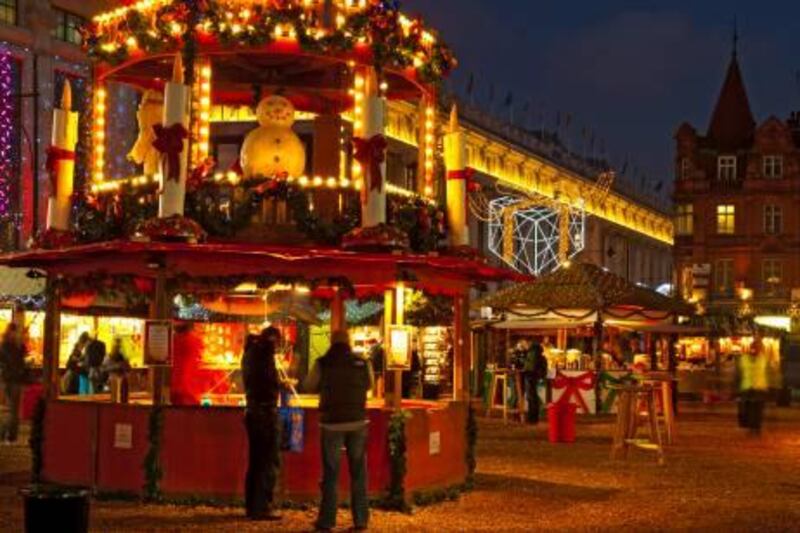BERLIN // Wooden stalls selling hand-made nutcrackers, the sweet scent of mulled wine wafting through the cold air, soft lights glinting all around, revellers eating sausages to the gentle melody of Silent Night being played from a discreetly placed sound system.
No one does traditional Christmas quite like the Germans, and the world has been warming to Teutonic festive culture in recent years.
The country's Federal Statistics Office announced with a hint of pride this week that German gingerbread exports totalled 9,100 tonnes in the first nine months of 2011, far exceeding imports at 2,800 tonnes.
The nation that gave the world the Christmas tree - the custom was made popular in Britain in the mid-19th century by Queen Victoria's German husband, Prince Albert - is enjoying growing demand for seasonal Stollen cake from Dresden, now a common sight in supermarkets across Europe, and for the famous wooden ornaments made by small craft businesses in the Erzgebirge region of eastern Germany.
Carousels rotated by the heat of candles, and "Räuchermänner" (Smoking men) that billow out incense through their pipes used to be confined to German households at Christmas. Now they are adorning living rooms in many other countries, thanks in part to the spread of the German Christmas markets that have become a common sight in many parts of Europe.
The trend is especially evident in Britain, where the markets have sprouted in scores of towns in recent years. Birmingham has the biggest one outside Germany, with 200 stalls, staffed entirely by German traders and selling German food and products. It is expected to attract some 3.5 million visitors this season, the same as last year.
Kurt Stroscher, an official from the Frankfurt tourist office, pioneered the establishment of the markets in Britain by setting up the first one in Birmingham, which is twinned with Frankfurt, in 1997. It had just 11 stalls and was intended as a small, one-off gesture to show the city how the Germans celebrate Christmas. Mr Stroscher had no idea at the time how successful the venture would be. It proved so popular that it has been an annual tradition ever since.
"The aim is to bring a bit of German culture, some of our traditions to the United Kingdom," Mr Stroscher said. "I think it's proved popular because before we came, people had nowhere to meet and enjoy themselves outside in winter. We offer them an environment for doing so. Besides, we all live in a globalised world, and most people like to experience the customs of other countries."
Mr Stroscher now runs markets in Manchester, Leeds and Edinburgh as well, using the traditional Frankfurt Christmas market as a model. "We work very authentically in line with the German style, only soft light, and no funfair rides apart from traditional carousels," he said.
Private entrepreneurs have joined the trend and set up their own markets in other cities including London, which has several, including one in Hyde Park and one lining the south bank of the river Thames near the London Eye.
The predilection for Teutonic traditions may seem a little incongruous in a proud island nation like Britain, especially given mounting British suspicions of all things European in the euro crisis.
But visitors say the markets are a calming antidote to the hectic, brash commercialisation of the festival. For some Britons, Christmas is synonymous with alcohol-fuelled office parties and frantic shopping.
Christmas markets have also sprouted in the US, the largest one being in Chicago. China and Japan have theirs too. But Mr Stroscher, a purist, sees a geographical limit to the spread of German Christmas culture, at least when it comes to his own authentic brand of market.
"I see too many obstacles to setting up markets in China, the US etc," he said. "The problems of overseas transport, the different mentalities."
The people of Birmingham, for their part, have grown so fond of their "Frankfurt Christmas Market" that they have rejected attempts to infuse it with home-grown traditions. A few years ago, when the city council suggested giving the market some English flair by adopting a Charles Dickens theme, there was such a public outcry that the councillors quickly backed down.
Since then, everything has stayed reassuringly German.






